September 13
After coffee with Tom, we were picked up at Tom’s house this morning by our friends Pat and Steve Hemmens. As you will learn, one could hardly have chosen anyone better to be chauffeured around by.
Back in 1976, as a young partner at my law firm, I was fortunate to have a terrific secretary, Pat Kenny. And, as she was British, I benefited from the added prestige of having a secretary with a British accent answer my phone.
Pat was feisty, to understate it a bit, and had strong opinions on just about everything. She’d come into my office regularly to complain about the latest outrage at the firm, hinting that she wasn’t sure she could take this any longer. I would hear her out and tell her that I would be very sorry if she were to leave, but she had to do what was right for her. Eventually she would calm down, as among other things, she was fiercely loyal to me and would never have left me to fend for myself. Pat was much more than a secretary, but a friend of the whole family.
In 1980, she got married to Steve and moved back to London to begin her family of three boys, Daniel, Will and Rob. Pat and I remained in touch quite regularly through emails on everything from family to politics to the Cubs, who Pat has continued to follow. We saw Pat and Steve on a trip to London, when we travelled there with our daughters in 1985. The photo below is of Pat and, below that, Pat, Steve, their boys, Daniel and Will, and me with Jodi and Wendy (Carol evidently took the photo).
You will notice on the right a black car, which is Steve’s office, since he is a London taxi driver. They kindly offered to pick us up, transfer us to the club we are moving to and drive us around London and then out to the country. We rode in the Hemmens’ car, rather than Steve’s taxi, since, as Pat pointed out, the latter is not air conditioned.

And here is Pat, also in 1985, with a hint of Dan.
We rode a bit over an hour out to Henley on the Thames, where famous rowing races are held annually, and where two different Olympic regattas had been held. The day was sunny and lovely, if a bit warm. We walked for a while along the river.
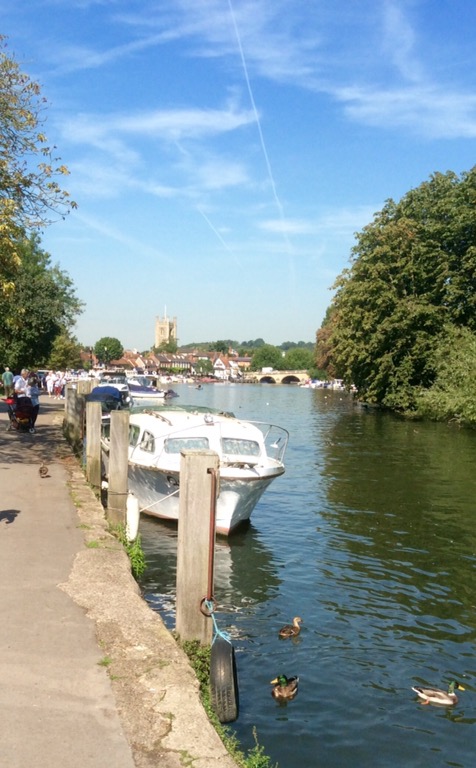
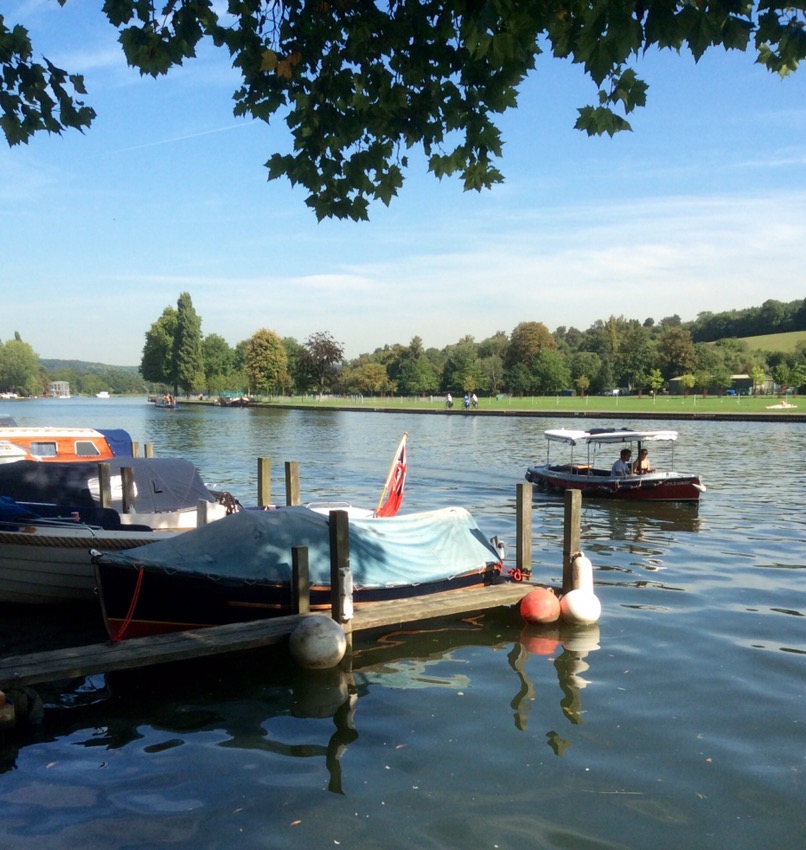
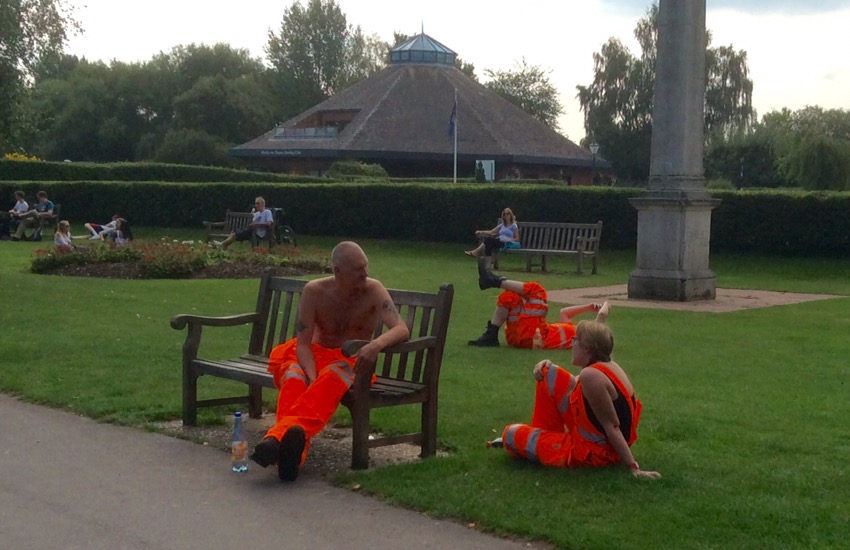
From there we drove about another 20 minutes to an area called Stoke Row, where Pat had booked lunch at a charming pub with excellent food, called The Crooked Billet.
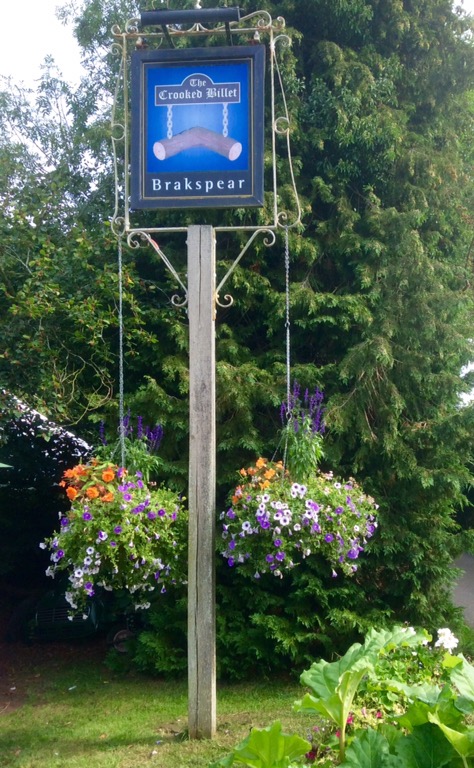
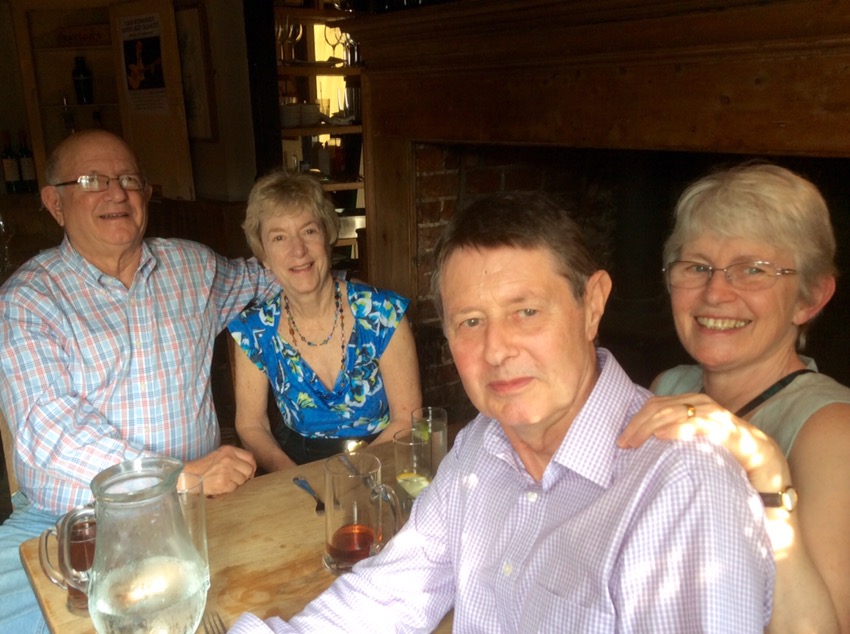
Over lunch, we had an opportunity to continue and expand our conversations, started in the car, about life at Sonnenschein, when Pat was my secretary, our families, the many volunteer activities Pat engages in and the impact (very significant) of Uber on the taxi business in London. Quite a wonderful couple hours.
The Crooked Billet is reputedly the inspiration and site for the poem The Highwayman by Alfred Noyes, one of Pat’s favorites when she was young. For those interested, here it is.
BY ALFRED NOYES
PART ONE
The wind was a torrent of darkness among the gusty trees.
The moon was a ghostly galleon tossed upon cloudy seas.
The road was a ribbon of moonlight over the purple moor,
And the highwayman came riding—
Riding—riding—
The highwayman came riding, up to the old inn-door.
He’d a French cocked-hat on his forehead, a bunch of lace at his chin,
A coat of the claret velvet, and breeches of brown doe-skin.
They fitted with never a wrinkle. His boots were up to the thigh.
And he rode with a jewelled twinkle,
His pistol butts a-twinkle,
His rapier hilt a-twinkle, under the jewelled sky.
Over the cobbles he clattered and clashed in the dark inn-yard.
He tapped with his whip on the shutters, but all was locked and barred.
He whistled a tune to the window, and who should be waiting there
But the landlord’s black-eyed daughter,
Bess, the landlord’s daughter,
Plaiting a dark red love-knot into her long black hair.
And dark in the dark old inn-yard a stable-wicket creaked
Where Tim the ostler listened. His face was white and peaked.
His eyes were hollows of madness, his hair like mouldy hay,
But he loved the landlord’s daughter,
The landlord’s red-lipped daughter.
Dumb as a dog he listened, and he heard the robber say—
“One kiss, my bonny sweetheart, I’m after a prize to-night,
But I shall be back with the yellow gold before the morning light;
Yet, if they press me sharply, and harry me through the day,
Then look for me by moonlight,
Watch for me by moonlight,
I’ll come to thee by moonlight, though hell should bar the way.”
He rose upright in the stirrups. He scarce could reach her hand,
But she loosened her hair in the casement. His face burnt like a brand
As the black cascade of perfume came tumbling over his breast;
And he kissed its waves in the moonlight,
(O, sweet black waves in the moonlight!)
Then he tugged at his rein in the moonlight, and galloped away to the west.
PART TWO
He did not come in the dawning. He did not come at noon;
And out of the tawny sunset, before the rise of the moon,
When the road was a gypsy’s ribbon, looping the purple moor,
A red-coat troop came marching—
Marching—marching—
King George’s men came marching, up to the old inn-door.
They said no word to the landlord. They drank his ale instead.
But they gagged his daughter, and bound her, to the foot of her narrow bed.
Two of them knelt at her casement, with muskets at their side!
There was death at every window;
And hell at one dark window;
For Bess could see, through her casement, the road that he would ride.
They had tied her up to attention, with many a sniggering jest.
They had bound a musket beside her, with the muzzle beneath her breast!
“Now, keep good watch!” and they kissed her. She heard the doomed man say—
Look for me by moonlight;
Watch for me by moonlight;
I’ll come to thee by moonlight, though hell should bar the way!
She twisted her hands behind her; but all the knots held good!
She writhed her hands till her fingers were wet with sweat or blood!
They stretched and strained in the darkness, and the hours crawled by like years
Till, now, on the stroke of midnight,
Cold, on the stroke of midnight,
The tip of one finger touched it! The trigger at least was hers!
The tip of one finger touched it. She strove no more for the rest.
Up, she stood up to attention, with the muzzle beneath her breast.
She would not risk their hearing; she would not strive again;
For the road lay bare in the moonlight;
Blank and bare in the moonlight;
And the blood of her veins, in the moonlight, throbbed to her love’s refrain.
Tlot-tlot; tlot-tlot! Had they heard it? The horsehoofs ringing clear;
Tlot-tlot; tlot-tlot, in the distance? Were they deaf that they did not hear?
Down the ribbon of moonlight, over the brow of the hill,
The highwayman came riding—
Riding—riding—
The red coats looked to their priming! She stood up, straight and still.
Tlot-tlot, in the frosty silence! Tlot-tlot, in the echoing night!
Nearer he came and nearer. Her face was like a light.
Her eyes grew wide for a moment; she drew one last deep breath,
Then her finger moved in the moonlight,
Her musket shattered the moonlight,
Shattered her breast in the moonlight and warned him—with her death.
He turned. He spurred to the west; he did not know who stood
Bowed, with her head o’er the musket, drenched with her own blood!
Not till the dawn he heard it, and his face grew grey to hear
How Bess, the landlord’s daughter,
The landlord’s black-eyed daughter,
Had watched for her love in the moonlight, and died in the darkness there.
Back, he spurred like a madman, shrieking a curse to the sky,
With the white road smoking behind him and his rapier brandished high.
Blood red were his spurs in the golden noon; wine-red was his velvet coat;
When they shot him down on the highway,
Down like a dog on the highway,
And he lay in his blood on the highway, with a bunch of lace at his throat.
. . .
And still of a winter’s night, they say, when the wind is in the trees,
When the moon is a ghostly galleon tossed upon cloudy seas,
When the road is a ribbon of moonlight over the purple moor,
A highwayman comes riding—
Riding—riding—
A highwayman comes riding, up to the old inn-door.
Over the cobbles he clatters and clangs in the dark inn-yard.
He taps with his whip on the shutters, but all is locked and barred.
He whistles a tune to the window, and who should be waiting there
But the landlord’s black-eyed daughter,
Bess, the landlord’s daughter,
Plaiting a dark red love-knot into her long black hair
Later in the afternoon, Pat and Steve drive us back to London and drop us at The Sloane Club in Chelsea. We are able to gain access to the Club because of Sarah Callander Beckett, a good friend of our travel agent (who did not work on this trip), Jean Zunkel. Sarah kindly arranged this, though we’ve never met her.
After checking in and unpacking, Carol and I take the tube to meet Tom and Judith at the Gielgud theater to see The Curious Incident of the Dog in the Night. Carol and I had seen the play in New York, and absolutely loved it. We were very keen to take Tom and Judith, and anxious to see it again ourselves. All four of us were enthusiastic about the show.
After the show, we had dinner at an Indian restaurant near the theater, then took the tube back to the Sloane Club to retire.
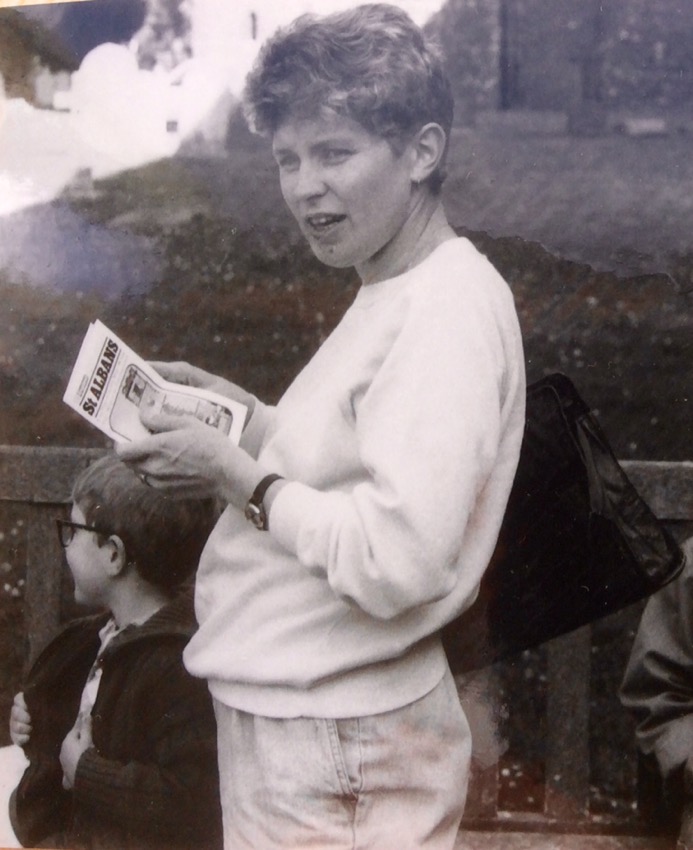
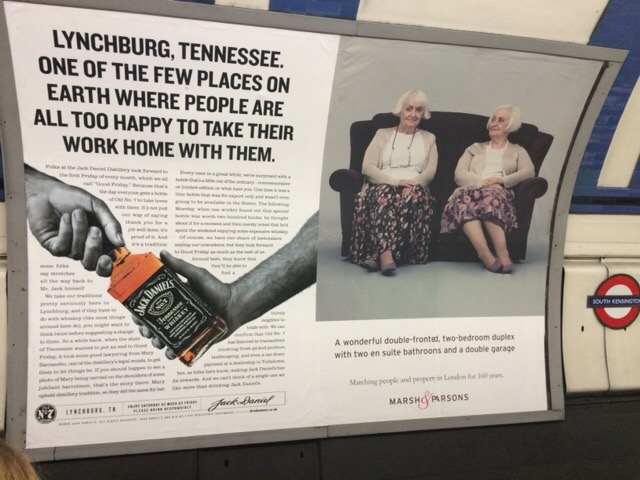

So glad the Sloane Club worked out….Hope is is just fine.
Returned from Iran to NY yesterday….In DC for the weekend.
Back to NY on Monday to work. Sounds like you are having fun.
It’s really fun to catch up on your blog, Dadz. I know how fond you are of these people. I remember tales from your year in London and I remember the warmth and high praise that came with any conversation that involved Tom, Steve, Andrew, Pat … And I remember our trip to London. I seem to remember a picnic or two that you’ve recalled in this blog. I remember listening to the Beatles quite a lot (according to my recollection, for the first time, though that seems impossible). I vaguely remember our flat and I distinctly remember Mom pulling out a book at every tube stop, despite your agitation (Go, Maz!). I think I remember being introduced to John and his work, and, obviously, like Kay, I remember his paintings throughout our house. (The large one is one of my favorites.) Enjoy what’s to come and I’ll enjoy reading about it.